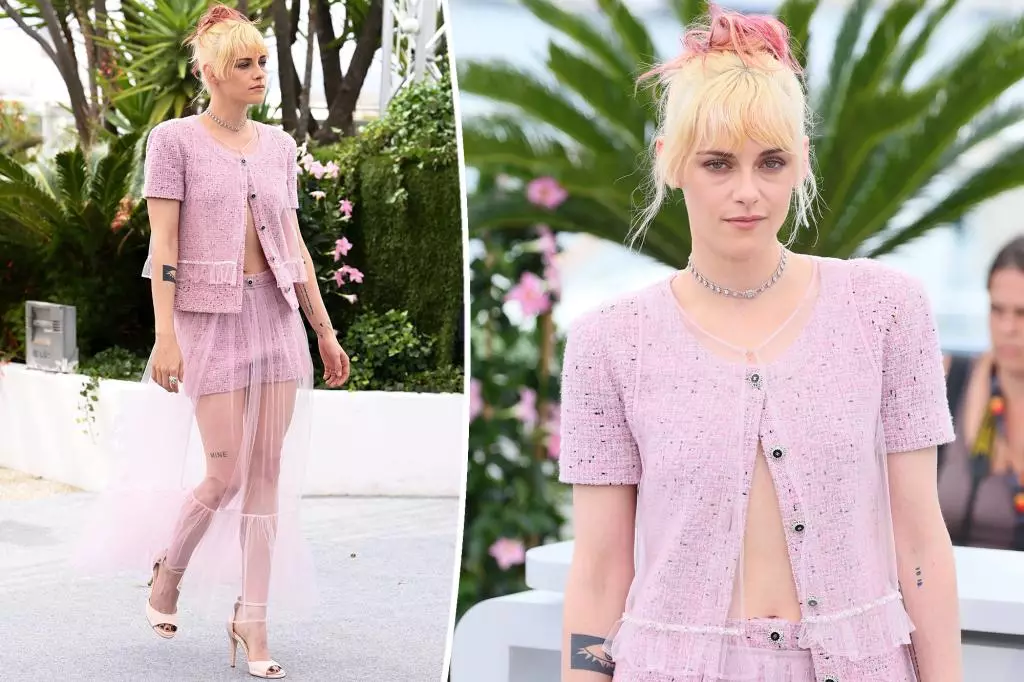Kristen Stewart has always been a trendsetter rather than a trend follower. Her daring choices and unapologetic attitudes have redefined what it means to walk the red carpet. At the recent Cannes Film Festival, Stewart showcased both her fashion prowess and her independence, subtly navigating the festival’s newly instituted dress code. The event is known not only for its glamorous events but also for evolving cultural norms within the fashion industry. This juxtaposition between traditional expectations and modern expression has never been more apparent than in Stewart’s appearance during the premiere of her directorial debut, “The Chronology of Water.”
Stewart’s outfit—a sheer maxi skirt layered over a sophisticated short tweed suit—was a clever reinterpretation of the festival’s stipulations, particularly the controversial statement that “nudity is prohibited on the red carpet.” While she technically adhered to the rules, the layering technique allowed her to flaunt her personal style while making a statement. This blend of rebellion and respect for the festival’s guidelines echoes her established rapport with fashion—not merely wearing clothes, but using them as a medium to communicate her narrative.
Breaking Barriers with Style
Fashion has historically served as a platform for self-expression, and Kristen Stewart’s ensemble reminded everyone that the red carpet can still be a space for innovation within restrictions. By wearing a Chanel piece that combined elegance with an edge, Stewart demonstrated how fashion can transcend rules. The light pink skirt trailing behind her adds an ethereal quality, while the tweed suit grounds the look in contemporary sophistication. The careful balance embodied in her choice reflects a broader trend of redefining femininity in the age of powerful public figures who rise against societal norms.
However, the Cannes dress code has sparked debates about gender expression in the fashion world. Some high-profile attendees, such as Heidi Klum and Halle Berry, opted to challenge these new regulations outright. Klum’s voluminous floral gown and Berry’s last-minute outfit change sparked conversations about not just fashion, but also about the expectations placed on women. While Stewart chose a path of subtle subversion, other actresses opted for overt rebellion. This raises critical questions: Should fashion at prestigious events like Cannes be confined by rules? And what does it say about the industry when prominent figures defy these expectations?
A Key Moment for Modern Feminism
Stewart’s sartorial choices signify more than a playful push against a dress code; they represent a broader dialogue about individual agency in a highly curated environment. Following her marriage to screenwriter and film producer Dylan Meyer, now more than ever, Stewart seems intent on asserting her identity both personally and professionally. Marriage, a traditional institution often laden with expectations, finds itself juxtaposed with Stewart’s fearless approach to her public persona. This confluence of marriage and rebellion in fashion poses intriguing inquiries. Is she showcasing a new model for women in public life—one where they can embrace love while still making their individual voices heard?
Additionally, the women of Cannes, from Stewart to Berry and Klum, embody an evolving definition of femininity that defies binary norms and rigid classifications. Whether they comply with existing rules or choose to break them, they wield significant influence, challenging what it means to be a woman in the spotlight. Stewart’s daring pink dip-dye and playful messy bun encapsulate not just a fashion statement, but an assertion of freedom.
The Future of Festival Fashion
Kristen Stewart’s appearance at Cannes marks a pivotal moment in festival fashion and cultural discourse. As traditional norms and modern expressions clash on a global stage, her choices inspire a new generation of artists, actors, and fashionistas. The ability to meld personal identity with professional expectations could pave the way for future attendees to embrace authenticity above adherence to legacy conventions. The Cannes Film Festival serves as a fertile backdrop for this evolution, echoing a universal call for freedom of expression in every facet of life, including how one chooses to appear before the camera and the world. Through her fashion and fierce individuality, Stewart continues to redefine what it means to be both an actress and a woman in contemporary society, blending artistry with activism, one red carpet at a time.

